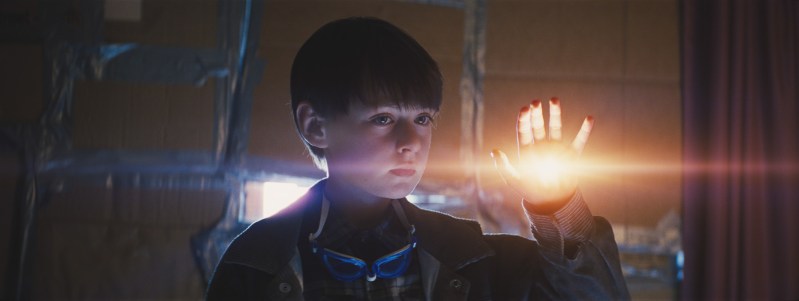Decades ago, when mid-budget awe still held weight, films about family and mystery characterized and energized the sci-fi genre. When they write the long history of father-figure sci-fi cinema, Jeff Nichols and “Midnight Special” will join this tradition, earning a place amongst the Spielberg canon, even as the film transcends the limits of imitation to find its own unique voice.
“Midnight Special” follows quiet Roy (Michael Shannon), his son Alton (Jaeden Lieberher) and Roy’s friend Lucas (Joel Edgerton) as they make their way across the highways and motels of the southern United States. The three are fugitives from both justice and the looming cult built around the mysterious, supernatural powers of Alton. And, as they wind through swamps and plains, the chaos around Alton builds and builds as the forces of the adult world converge around his unnamed destination.
“Midnight Special” is indeed a film about family, about the nods exchanged between the quiet father and his reality-defying son, about the quiver of lower lips, about hard choices made in defiance of an unfair world. But within the quaking eyes of those who meet Alton and the rhythms of David Wingo’s wonderfully treading score, Nichols forms another narrative — a simple story of how wonder and belief seep into the rational universe, enlarged and emboldened by the blanketed lights and fleeting rays bound to anyone who believes in something greater.
Throughout his career (“Shotgun Stories,” “Take Shelter”), Nichols has shown a burning interest in the cross-section of the familial and mysterious. And, within the realist landscape of central Texas and watery Louisiana, Nichols weaves another tale of discovery. The opening of “Midnight Special” is drenched in shadows, filled with spellbinding images only lightly explained (he has little interest in exposition). Panning across a shrouded, barren landscape, we track a beat-up Chevy speeding through the night. The headlights of three buses crest slowly over an unseen hill. A young boy reads comics by flashlight. These images epitomize the understatedness of Nichol’s work; he’s reluctant to reveal why people seek Alton until the narrative makes it necessary.
Those pursuing that “why” are divided between the chasers (the FBI, the NSA, the agents of a Texas cult — all interested in Alton for their own reasons) and the chased (the boy himself, his father and Lucas). They are bound together by Alton and the chaos his lighted visions bring into the world, but separated by their intentions. Shannon’s Roy is drawn to protect his son by the dictates of fatherhood, by the anxieties of caring, as is his estranged mother Sarah (Kirsten Dunst) and the grizzly Lucas (played by Edgerton with equal parts pulsing jawline and welcome wariness). But their knowledge of Alton is limited to the breadth of their questions. These questions go unanswered until Sarah empathetically asks Alton — why?
Precocious sci-fi children tend to leave wreckage in their wake, and Alton is no exception — which means scientist Paul Sevier (Adam Driver) must pick up the pieces of the chase. Driver plays Sevier with eager eyes and an oddball curiosity that distinguishes him from his bureaucratic counterparts, whose concerns are limited to whatever threat this supercharged kid might represent to interests here and abroad. That isn’t Sevier’s worry — he wants to understand — and thus, he’s brought further and further into the mystery until he must consider belief on its own terms.
Given the skeptical craning of his neck and the wry drip of his words, few contemporary actors are better equipped for the role of a truth-pursuing scientist, so it’s a shame when the narrative leaves Driver somewhat stranded. His confused charisma proves a welcome contrast to the settled Americana of the film’s protagonists, who at times act as archetypal ciphers of empathetic determination. The brisk pace of the story and the realist quietude of the actors serve the functionality of the film well, but that pace brings its own restrictions — a reluctance toward contrivance means some of the film’s most compelling possibilities (Sam Shepard as the reverend Calvin Meyer, chewing scenery like a hot bowl of oatmeal; the religious weight of Alton’s appearance; familial backstory) are left somewhere behind the beat-up Chevy and the hope it carries.
Still, the car rides on, and Nichols illuminates and composes with the keen eye of a filmmaker determined to discover the axis around which sci-fi turns. This is a film about belief, but not the kind you or I might articulate as ideology or control, as dictum or principle, as fiction or fact. It’s less preoccupied with what a sunrise represents (whatever you want it to!) than how a sunrise feels: the warmth spreading, the wind pushing against the grass, the moment of recognition between sun-child-father-mother that precedes all things healed and unhealed. This is a sunrise, an opening of possibilities — not a shuttering of governmental or spiritual control.
There are explosions in “Midnight Special.” There are guns, meteors, car crashes and camouflaged men. But there is also a fundamental decency, defined by familial hugs and the tears of adults hearing and seeing things they must somehow now accept. To believe in Alton and what he may bring is not to claim a Messiah figure — it is to protect him, to listen. It’s to embrace light and the wondrous visions shared by scared humans, yellow grasses and tattered highways. All these elements belong to a place called home, a place sought and found beneath the flickering light of gas station mirrors and interrogation rooms, where a makeshift family finds wonder in what has been seen, and what can be hoped.
Contact Connor Huchton at chuchton ‘at’ stanford.edu.
